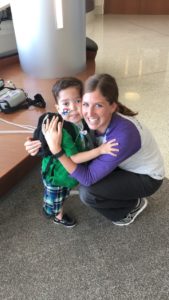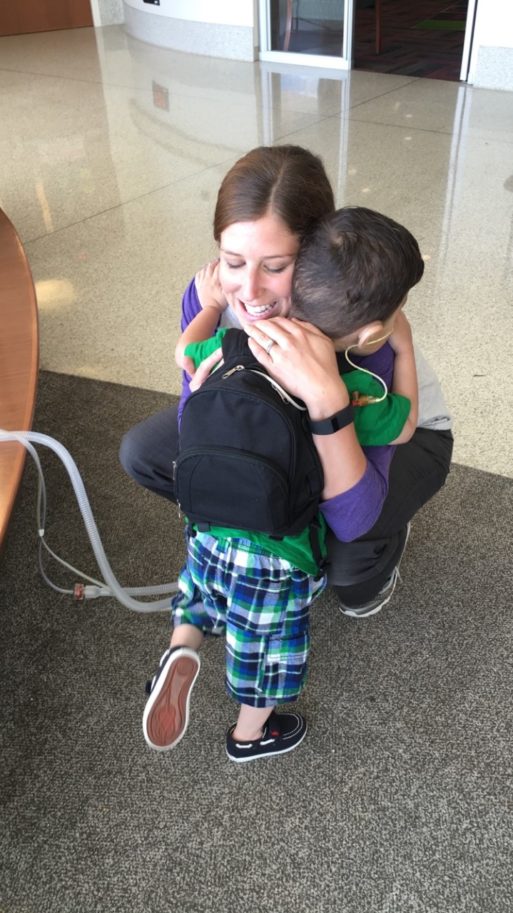In this second part of a two-part interview, SevenPonds continues its conversation with Kelsey Mora, a certified child-life specialist (CCLS) at Advocate Health in Chicago and chair of their system-wide pediatric and perinatal bereavement support group. Her work as a CCLS provides in-person support for children and adolescents facing acute and chronic medical challenges of their own or that of a family member.
Editor’s note: This interview has been edited for length and readability.

CCLS Kelsey Mora offers hugs
and coping skills to her young patients.
Laura B. Hayden: Welcome back Kelsey. Last week you told us that child-life specialists use therapeutic play to support children and their families in health care settings. Can you tell us more about that?
Kelsey Mora: One of the best ways a child-life specialists connect with children is through therapeutic play. Developmentally, children do not have the verbal language skills to express their thoughts and feelings about being a patient or watching someone close to them being treated. Playing, however, comes naturally to them — it’s what they do, even when they are sad. When children play they express what is troubling them.
A lot of what we do is fun — it looks like play, but it has a much deeper meaning. A scavenger hunt encourages a child to walk. A sticker chart keeps track of breathing exercises. There is a purpose behind every activity. It’s important to get down to their level, physically and intellectually. Children’s books and art help. A grieving child may not be able to talk about their pain, but they might draw Angry Birds.
Laura: Now this is a difficult question to ask, no less answer. While you see most of the children you work with get better, others are chronically ill and terminally ill. How do they respond to your work with them?
Kelsey: Yes, I work with children who face grave illness. Many get better but some are facing death in the ICU. The most common is the oncology population. But terminally ill children yearn for normalcy just like well children. They want to take part in normal life experiences, playfulness and fun. What most people do not realize is that kids are resilient and can face very difficult things. It’s so important to let their voices be heard.
The same goes for children who grieve great losses. It’s not unusual for child-life specialists to have the same patients for years. One young girl I work with has received support for four years now. She has different needs now than when she started.
I coach parents quite a bit about what to say to grieving children. I tell them to use concrete language — to say “died” instead of “passed away,” and to convey the message to the child that they can handle whatever the child needs to express about what they are going through, be it illness or grief. Sometimes I ask children to journal about how they feel or write a six-word memoir title that tells their story. When I think about why I do what I do, I think about the six-word memoir title I created during a narrative medicine self-care event.

Kelsey’s caring hugs are sure to be returned.
Laura: Would you share that?
Kelsey: Sure – making hard moments into better memories.
Laura: Those six words say a lot. You’ve really helped me understand your role with these children. What would you say is the best part of your job?
Kelsey: The best part of my job is when children, faced with life’s most challenging events, heal– not just physically, but emotionally. When they smile for the first time during a music therapy session. Or when they use an arm attached to an IV to engage in an intervention with art therapy, because they understand that the IV is just a “soft straw” and not a needle. And when they feel proud after holding still through a CT scan because they were prepared and knew what to expect.
Just like my six-word memoir title says, I try to make the hard moments into better memories. I know the little girl I talked about last week, who lost her mother and brother in a car accident, will be a teenager 10 years from now. And she will still snuggle with her hospital fleece blanket and hold onto her mementos of her mother and brother. When she returns to the doctor for a follow-up visit, she will not feel scared but will feel excited to visit her hospital family, knowing that they will help her and not hurt her.
Laura: Yes, that is quite an accomplishment! Thank you so much for sharing your time and stories with the SevenPond readers. You do such important work for very special people.
If you missed part one of our interview with Kelsey Mora, you can read it here.

 How do Child-life Specialists Help Children Cope with Illness and Death?
How do Child-life Specialists Help Children Cope with Illness and Death?


 Our Annual Seven Holiday Gifts for Someone Who Is Grieving, 2024 Edition
Our Annual Seven Holiday Gifts for Someone Who Is Grieving, 2024 Edition
 “Making Mobiles” by Karolina Merska
“Making Mobiles” by Karolina Merska
 “Hands Up to the Sky” by Michael Franti & Spearhead
“Hands Up to the Sky” by Michael Franti & Spearhead














